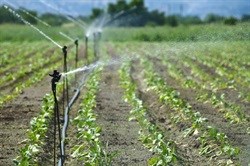
Top stories


Marketing & MediaWarner Bros. was “nice to have” but not at any price, says Netflix
Karabo Ledwaba 1 day



Logistics & TransportMaersk reroutes sailings around Africa amid Red Sea constraints
Louise Rasmussen 19 hours

More news


















"Most farms that use water for irrigation, or for watering livestock in feedlots, will be required to apply for a water use licence, in the same way as the mining and industrial sectors," says Lindsay Shand, principal environmental geologist at SRK Consulting's Cape Town office. "The aim of this process - driven by the National Water Act - is to ensure that the distribution of this increasingly scarce resource is fair and sustainable."
Obtaining legal authorisation as a water user allows farmers to strengthen the risk profile of their business, as it may become difficult to sell or re-develop the property if the entity is not fully compliant. Without carrying out the investigations required for licensing, there is the danger of impacting negatively on neighbours and other water users, possibly leading to expensive remediation processes in the future.
She says there was still a lack of knowledge in the agricultural sector about the need for these licences, mainly because this sector was traditionally not required to hold them. Now, however, any farmer taking water from a surface water or groundwater resource, storing water, discharging effluent water, altering banks or impeding and diverting the flow of water in a watercourse falls under section 21 of the National Water Act - depending on the volume of water involved and the present aquifer status of the quaternary catchment in which it is situated in.
The licensing process was initially hampered by long delays within the then Department of Water Affairs in getting the applications processed and licences issued. There were also numerous incidents of content errors within the issued licences, making it difficult for the water user to strictly comply.
"Fortunately, there have been better systems put in place in recent years to speed up the licensing process, so this need not deter water users from pursuing their applications," says SRK hydro-geologist, Candice Lasher.
Businesses such as wineries, food canneries and feedlots that discharge waste water - or dispose of waste in any way that may affect a water resource - are also subject to the Act, according to Desmond Visser, associate partner and principal hydro-geologist in SRK's Cape Town office.